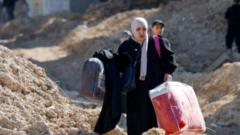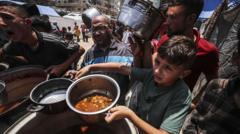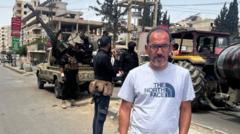As Israeli military operations displace thousands from West Bank camps, families like Alaa Ofi's are facing dire circumstances without access to essential documents or resources. Local leaders label the actions as a calculated destruction of Palestinian life, while concerns mount over the prolonged impacts of the ongoing conflict.
Displacement Crisis: 40,000 Palestinians Flee Amid Israeli Military Operation in West Bank

Displacement Crisis: 40,000 Palestinians Flee Amid Israeli Military Operation in West Bank
Ongoing Israeli raids lead to the largest displacement of Palestinians in decades, as families struggle to cope with the aftermath.
The month-long military operation in the West Bank continues to unsettle the lives of approximately 40,000 residents from four Palestinian refugee camps. Families have been forced into a state of crisis, with individuals like Alaa Ofi desperate for help amid the chaos. "We took nothing with us," lamented Ofi, highlighting the severity of their situation as they left vital documents and personal belongings behind—an especially troubling prospect as his wife is due to give birth soon without insurance papers or ID.
This unprecedented displacement follows Israeli raids on the Tulkarm refugee camp, and it is reported by aid organizations to be the most significant forced exodus since the Six-Day War in 1967. Conditions in the camps have deteriorated sharply; homes have been demolished, and the roads have been devastated as Israeli forces tackle perceived militant threats.
The situation has escalated to a level where the Israeli government has deployed tanks for the first time in over two decades, marking a decisive shift in military strategy. Israeli officials frame their actions as necessary to combat terrorism, which they attribute to militant groups based in the camps. However, the local Palestinian governor, Dr. Abdullah Kmeil, decries this operation as a calculated effort to create a "hostile environment" for displaced persons.
Residents recount harrowing experiences of being driven from their homes, with some forced out at gunpoint or receiving evacuation messages via drone. The ongoing conflict has left many families grappling with urgent needs while shelters become increasingly scarce.
Amidst the turmoil, everyday life has been significantly affected: roads are rendered impassable, and community structures are in disrepair. Local sentiments echo Alaa Ofi's fears: "If we can't go back to our house for a year, it's going to be a disaster."
With the uncertainty of how long these conditions will persist, the call for international attention and advocacy remains more important than ever as the people of these camps face an ongoing struggle for survival.





















